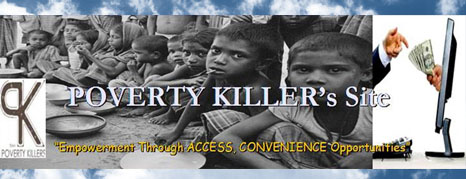way to reduce poverty is by regulating laws that force children to attend schools
One way to reduce poverty is by regulating laws that force children to attend schools and gain education up to at least a certain level. This is easier said than done, however it isn't impossible.
- One way to accomplish this goal is by paying the child's parents, who are reluctant to send their children to school and earn below a certain level of income, a monthly allowance, the same that the child would have earned if he was forced to work. The allowance can be more than what the child could have earned to give a greater incentive to the parents to send their children to school
- A second way to alleviate poverty is by opening 'industry specific' institutes, which provide skilled training to people at subsidized costs. This would improve the quality of labor and make them more efficient hence improving the economic condition of the country thereby reducing poverty.
- A third way to reduce poverty, especially in rural areas, is to make it compulsory on all university students to go to a village and teach for six months. Private universities all over Pakistan should make it a compulsory requirement for its entire graduating student to provide basic education to the children of rural areas. Completion of this requirement will make the student eligible to get his degree.
- Finally, laws should be passed that protect people unaware of their rights. Those people who are found to exploit the illiterate working class should be given strict punishments. In order to make people aware of their rights government sponsored advertisements and awareness seminars should be conducted throughout the country, especially in rural areas.
Source: http://www.bukisa.com/articles/446347_illiteracy-and-poverty
stimulus packages for employment

Since Obama took office in 2009, various government programs and bailouts have been instituted to stimulate the economy, including Cash for Clunkers and a tax credit for home buyers. In February 2009, Congress passed the American Recovery and Reinvestment Act, a stimulus package infusing $787 billion into the economy. But unemployment still soared. The average unemployment rate for 2008 was 5.8 percent. In 2009 the average annual rate shot up to 9.3, topping out at 10.1 percent in October. In 2010, the unemployment rate has hovered around 9.7 percent, dropping to 9.5 percent in June and July. Obama and others have touted the stimulus as preventing a depression. Republicans, however, characterize it as wasteful, inefficient, and ineffective government spending at a time when the national debt continues to soar.
Democrats have continued to introduce smaller stimulus packages and unemployment benefits extensions, with limited success. Crossover votes from moderate Republican Sens. Susan Collins and Olympia Snowe have allowed some legislation to pass. In August 2010, the two were the only Republicans to vote with Democrats on a bill to give $10 billion to prevent layoffs of teachers, firefighters, police officers, and others. In 2011, Bush-era tax cuts are set to expire, sparking a debate over whether they should be extended. Republicans want to keep all the tax cuts in place, but Democrats prefer to let the cuts for people in the top tax brackets expire. Republicans argue that these taxes also catch many small businesses, which create jobs.
Source: http://www.usnews.com/topics/subjects/unemployment
Health Issues
A study by the U.S. Government Accountability Office released in 2007 showed that those who are in areas where poverty is abundant had fewer options in life. People living in poverty-stricken areas were more likely to have adverse health issues due to unaffordable health care, risky behavior and the lack of proper education. Those who experience poverty are more likely to suffer from health conditions due to being closer to freeways and industrial buildings that are not usually welcome in higher-income areas. There is also a notable historical rise in property damage that parallels the unemployment rate throughout American history (see Resources below).
Considerations
Diseases in the Developing World
- Bilharzia and Hookworms...
- Filariasis...
- Malaria...
- Dracunculiasis...
- River Blindness...
- Sleeping Sickness...
- Leishmaniasis and Chagas Disease...
- Taenia solium...
Rodelio C Sala's Expert Author Email Alerts
Sign up to receive email alerts of Rodelio C Sala's latest articles from EzineArticles.com!
Your Opportunities-->>


